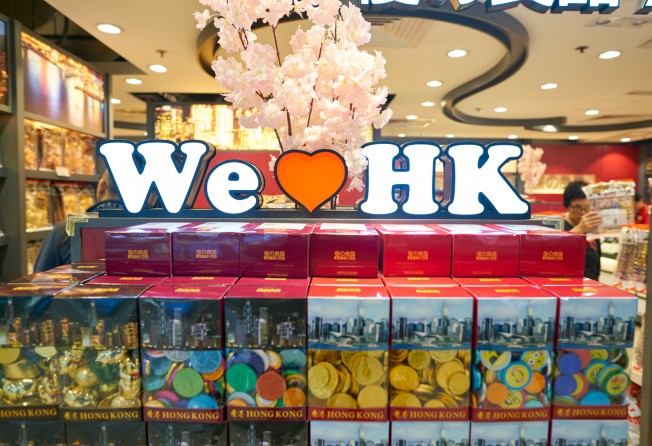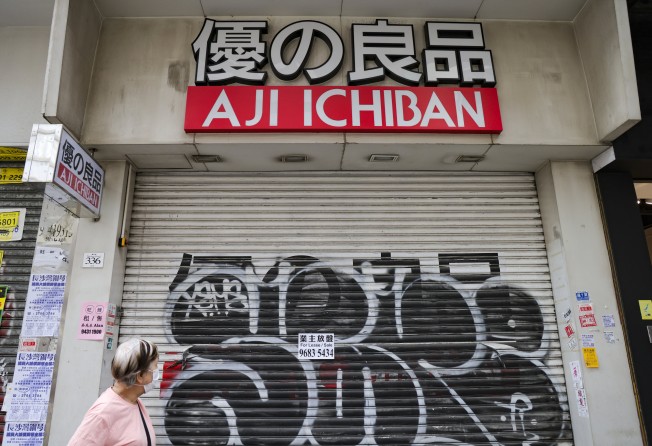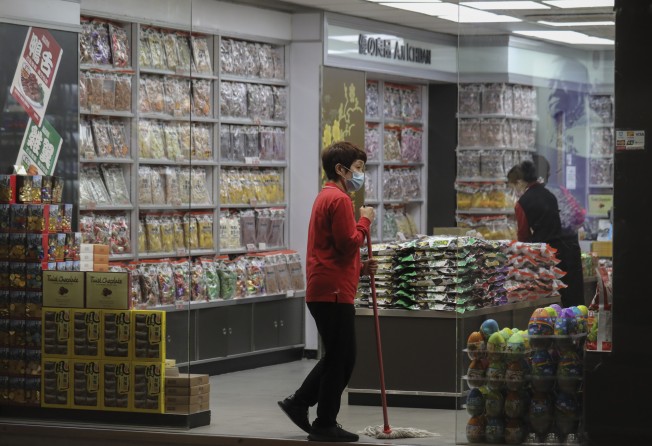
Coronavirus: Hong Kong snack chain Aji Ichiban shuts all 20 retail outlets amid losses from lack of tourists during pandemic
- Company once operated over 100 shops at its peak in 2007, but pandemic forced it to reduce stable of stores to about 20 this year as number of tourists dwindled
- Hong Kong Department Stores and Commercial Staff General Union calls on government to take steps to revive tourism in city

Hong Kong snack shop brand Aji Ichiban has closed all of its 20 retail outlets and laid off some 100 workers after suffering losses amid a lack of tourists in the city due to the Covid-19 pandemic, according to a union.
Hong Kong Department Stores and Commercial Staff General Union general officer Lam Chi-chung told the Post on Tuesday that Aji Ichiban had informed employees about two days ago that it had decided to close down all its outlets in Hong Kong at short notice.
The Post has contacted the chain for comment.

The Labour Department said it was concerned about the case and had contacted the employer to follow up on the situation. It called on the affected employees to contact the department for assistance about their rights and benefits.
“The Labour Department has reminded the employer to pay the termination compensation to the employees affected in accordance with the Employment Ordinance and the terms of the employment contract,” it said.
The news sent shock waves through the city’s retail industry as members expressed fears over more closures and lay-offs, with the tourism sector crippled by strict pandemic measures.
Lam said the retail chain once operated over 100 shops at its peak in 2007, hiring more than 700 staff, but under the pandemic, its stable of stores had dwindled to about 20 this year, with 100 workers each earning an average of HK$13,000 (US$1,660) monthly.
“Some employees told us they were informed by the company one or two days ago about its decision to fold all its retail stores in Hong Kong,” he said. “The company promised that they would make statutory severance payments and other compensation in accordance with the law.”
Lam said the union would keep a close eye on whether the group would settle wage and severance payments on time, adding it would also help affected staff look for jobs.
He also called on the government to reopen Hong Kong’s borders with mainland China, warning more company closures and staff lay-offs would follow if the government failed to do something to revive tourism in the city.
“I don’t rule out there may be waves of closures and lay-offs. The retail industry relies on local consumption and tourism income. If there are no tourists, many retail shops can’t survive,” he said.

The tourism-driven Aji Ichiban Company, founded in 1993 by veteran confectionery retailer Tony Lai Hin-tai, had been a popular go-to snack store in Hong Kong, selling items from various countries such as Japan and the United States.
Popular snacks included beef jerky, dried apricots, chocolates, nonpareils, spicy dried fish, shredded squid, shrimp crackers and wasabi peas.
The snack shop chain had been a popular shopping destination among mainland tourists, who snapped up items there as souvenirs for their friends and relatives back home.
But the group’s business was hard hit after mainland tourists stopped coming to Hong Kong because of the pandemic.
The Hong Kong Tourism Board reported a 97.4 per cent drop in the number of visitors in 2021, with arrivals from the mainland in 2021 falling 97.6 per cent from 2.76 million to just 65,694.
However, Financial Secretary Paul Chan Mo-po told the Legislative Council on Monday the city’s job market had begun to improve because of relaxed Covid-19 curbs, increased consumption and government aid, citing improvements in sentiment and consumption.
Residents had mixed feelings about Aji Ichiban’s closure.
“It felt like losing something that was a part of Hong Kong culture, but frankly, I haven’t been buying things from Aji Ichiban for a while,” said a housewife surnamed Keung, outside one of the outlets in Mong Kok.
Ivan Wong, 37, said he was concerned about the employees losing their means of livelihood.
“I didn’t buy much in the shop. But it is unfortunate for the employees, who are losing their salary,” he said.
Student Jeremy Cheung, however, said he was not bothered by the chain’s closure.
“I always thought the shop’s products were a bit expensive, and their targeted customers were mainland tourists who came to Hong Kong. It doesn’t feel like a loss to me, as I haven’t purchased anything from there for some time,” the 20-year-old said.
Additional reporting by Chester Wong